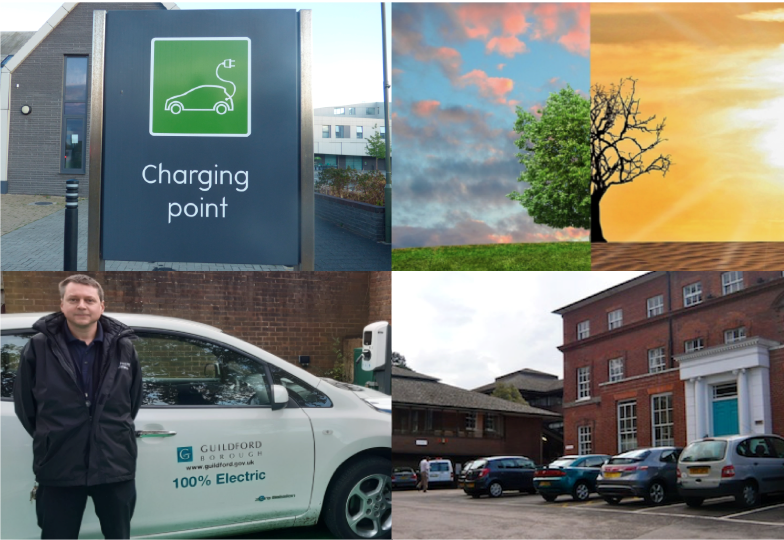 Abraham Lincoln
If given the truth, the people can be depended upon to meet any national crisis...
Abraham Lincoln
If given the truth, the people can be depended upon to meet any national crisis...
 Guildford news...
for Guildford people, brought to you by Guildford reporters - Guildford's own news service
Guildford news...
for Guildford people, brought to you by Guildford reporters - Guildford's own news service
Letter: The Real Maths Make A Nonsense Of The Carbon-Neutral Lobby
Published on: 18 Aug, 2020
Updated on: 18 Aug, 2020
In response to Council Agrees Strategy For Net-Zero Carbon But Plan Not Ready For The Public
I am now more and more fed up with the total hypocrisy of these jumped-up politicians who lecture us all on carbon-neutral.
Let’s find out where they live and see if they have done as much as your previous correspondent Jim Allen has done to his house. There is a saying: “Tidy your room before you try to change the world.”
How can we be carbon neutral? Wind farms take millions of tons of carbon in their manufacture and have a very limited lifespan with about 30% efficiency.
Electric cars take millions of tons of carbon to produce and run on electricity produced using carbon. A petrol-driven car driven for 14 years is estimated to be more carbon neutral than an electric car.
Photovoltaic cells take millions of tons of carbon to produce and have a very limited lifetime. I have done the maths: I would be very out of pocket.
Being long since retired, there is no way I can afford to move to any of these carbon-saving schemes and I am sure it’s the same for most retirees as well as the ordinary working population
The fantastically expensive commercial vehicles that run on electricity have yet to prove their worth. Batteries decline each year on ordinary small cars so I imagine the decline on these much more heavily used commercial vehicles will be much more dramatic. Car batteries are depleted to 70% in about six to eight years and need to be replaced.
We need to make a lot more progress, which I am sure we will do, but the know-it-all politically ambitious, politically correct, jumping-on-the-bandwagon twerps in local and national government have a lot to learn.
Responses to Letter: The Real Maths Make A Nonsense Of The Carbon-Neutral Lobby
Leave a Comment Cancel replyPlease see our comments policy. All comments are moderated and may take time to appear.

"Found any?" - "Nope, it all looks green to me!" (See Opinion: The Future is Congested, the Future is Grey)
www.abbotshospital.org/news/">





Recent Articles
- Latest Evidence in Sara Sharif Trial
- Ash’s New Road Bridge Is Named – and November 23rd Is Opening Day
- Class A in Underwear Leads to Jail Sentence
- Historical Almshouse Charity Celebrates Guildford in Bloom Victory
- Notice: Shalford Renewable Showcase – November 16
- Firework Fiesta: Guildford Lions Club Announces Extra Attractions
- Come and Meet the Flower Fairies at Watts Gallery
- Updated: Royal Mail Public Counter in Woodbridge Meadows to Close, Says Staff Member
- Letter: New Developments Should Benefit Local People
- Open Letter to Jeremy Hunt, MP: Ash’s Healthcare Concerns


Recent Comments
- Paul Spooner on Ash’s New Road Bridge Is Named – and November 23rd Is Opening Day
- Harry Eve on Opinion: The Future is Congested, the Future is Grey
- Nigel Keane on Letter: New Developments Should Benefit Local People
- Nathan Cassidy on Updated: Royal Mail Public Counter in Woodbridge Meadows to Close, Says Staff Member
- T Saunders on Opinion: The Future is Congested, the Future is Grey
- Jim Allen on Updated: Royal Mail Public Counter in Woodbridge Meadows to Close, Says Staff Member
Search in Site
Media Gallery
Dragon Interview: Local Artist Leaves Her Mark At One of England’s Most Historic Buildings
January 21, 2023 / No Comment / Read MoreDragon Interview: Lib Dem Planning Chair: ‘Current Policy Doesn’t Work for Local People’
January 19, 2023 / No Comment / Read MoreA3 Tunnel in Guildford ‘Necessary’ for New Homes, Says Guildford’s MP
January 10, 2023 / No Comment / Read More‘Madness’ for London Road Scheme to Go Ahead Against ‘Huge Opposition’, Says SCC Leader
January 6, 2023 / No Comment / Read MoreCouncillor’s Son Starts Campaign for More Consultation on North Street Plan
December 30, 2022 / No Comment / Read MoreCounty Council Climbs Down Over London Road Works – Further ‘Engagement’ Period Announced
December 14, 2022 / No Comment / Read MoreDragon Interview: GBC Reaction to the Government’s Expected Decision to Relax Housing Targets
December 7, 2022 / No Comment / Read MoreHow Can Our Town Centre Businesses Recover? Watch the Shop Front Debate
May 18, 2020 / No Comment / Read More








Bill Smith
August 18, 2020 at 10:42 am
Mike, let’s walk through the misunderstandings, miscalculations, and inaccuracies in your letter and hopefully it will clear things up a little, before I highlight areas that I agree with you.
Your fundamental flaw is equating carbon neutral with no CO2 production whatsoever. This is a huge misunderstanding. Carbon neutrality allows for carbon emissions, but an amount which can be balanced by natural carbon sinks (forests, the ocean, plants etc), and some Negative Emissions Tech (a max of 5% recommended by Guildford’s world renowned economist Tim Jackson of CUSP).
Wind farms have been shown in multiple studies to have a ‘payback period’ ie the time of clean energy production to offset carbon used in building them, as only 7 – 9 months. This figure includes extraction of raw materials, turbine production, transport, installation etc.
Photo voltaic (PV) cells do not have a very limited lifetime. The average PV set-up today has a life expectancy of about 30 yrs. Cost wise in the UK, the average time before they have paid for themselves through free energy is 8-10 yrs. So you get between 15-25 yrs of free energy with an average PV install.
Your comments on electric vs petrol diesel cars are a frequently repeated myth. All carbon costs considered, electric cars generate far lower carbon emissions across their full lifecycle.
Yes there are problems with electric batteries but this is technology that is improving at a rapid pace. Combustion engines have nowhere to go. They’re about as efficient as they’ll ever be. But clean energy technology is increasing in efficiency every year. The main takeaway with vehicles, is never, ever, buy a new car, because whatever option you opt for, it will be anywhere between 7 – 40 tons of carbon depending on size.
Now where I do agree with you is that you should not be expected to foot the bill to reach carbon neutrality. There is a stark choice here. Either we carry on as we are, or, according to every single major scientific organisation and the United Nations, we will pass the irreversible tipping points which lead to catastrophic climate breakdown by 2030. This is not conjecture. And in fact recent studies suggest we have already passed 9 of 11 of these tipping points, and that adaptation to the world our children face is now essential. Everything I say above is not my own calculations, as you have used. This is all from peer-reviewed studies and years of real-world evidence.
So you’re right. Why should Mike Murphy pay for this? Global governments are failing us. They are the ones who should be investing unprecedented amounts of money into a future for our children. They have deserted us in favour of corporate profit.
S Callanan
August 18, 2020 at 12:48 pm
“Carbon neutrality allows for carbon emissions, but an amount which can be balanced by natural carbon sinks (forests, the ocean, plants etc)”.
Is there anything to prevent double counting of the natural carbon sinks by all the organisations anxious to be carbon neutral?
Peter Ambrose
August 18, 2020 at 2:01 pm
An excellent response from Bill Smith.
Too many people are getting their information from poorly informed, deliberately misleading or downright dishonest social media posts and tabloid articles.
Climate change is real, it’s extremely serious and there are good, cost-effective solutions ready to go as long as there is a will to overcome vested interests and implement them.
Sam Peters
August 21, 2020 at 6:11 pm
Fantastic response from Bill Smith – nothing else to add! We can only hope this letter was a genuine, if confused, set of views rather than a cynical attempt to mislead.
I’d hope for a bit more editorial oversight on things like this where multiple statements which would appear to be false are being made.
Alan McNeilly
August 18, 2020 at 2:49 pm
Mike, your letter is stuffed full of inaccurate and misleading information.
I agree wholeheartedly with Bill Smith’s reply. I feel the more informed amongst us have to challenge the myths and fake news, and also point people at the vast array of correct information available from independent sources.
I recommend you have a look at the Fully Charged Show website. http://www.fullycharged.show – Robert Llewellyn (Cryten from Red Dwarf) hosts the site in person, not character. His regular entertaining videos and blogs put the record straight on all your topics, and in a far more entertaining way than I ever could. I advise believers and doubters all to have a look.
David Middleton
August 18, 2020 at 6:21 pm
One point.
“Never buy a new car”.
Well, if nobody ever buys a new car, the supply of second hand cars will soon dry up and we’ll be back on horseback pretty soon!
John Lomas
August 18, 2020 at 10:41 pm
I think the point is there are more than enough new cars being leased or bought on those low finance schemes by businesses and then disposed of at 12 months with low mileages to keep the average private car owners satisfied.
How accurate that is I’m not sure but I have seen huge stockpiles of such cars scattered around the country.
Jim Allen
August 18, 2020 at 7:36 pm
Interesting comments.
We went ‘our way’ because we wanted lower bills and simpler living. Why would we pay more for our hot water just because some guy in the city wants more money for the same fuel?
All these carbon coupons and sinks are a nonsense, just paper shuffling to look good; no real effect on pollution or climate change.
The internal engine is not dead, just petrol and diesel. The way forward is hydrogen!
The argument of don’t buy a new car is ultimate carbon neutral because you haven’t built two of an item when one only one is needed. The only time to replace a car is when it is fully worn out or damaged beyond repair.
The principle of don’t buy anything until its broke or worn out is the most carbon neutral you can ever get. Not good for manufacturing but did you really need to change your second car because the colour was wrong!
Jules Cranwell
August 19, 2020 at 2:28 pm
My car was built 57 years ago, 50 years in my ownership, and has been in constant use. I believe this is more carbon neutral than any throw-away vehicle, including electric. A great, British, Sunbeam Alpine.
Also does not contain the toxic chemicals needed for electric car batteries.
Peter Elliott
August 19, 2020 at 11:20 am
It seems we are being led to believe that electric cars are the answer to all this.They obviously have a lot going for them, but there are serious drawbacks as well.
They use up a lot of rare minerals in the construction of their batteries and they will require a huge investment to put in charging points all over the country. Then there is the question of whether the national grid could cope with all that extra demand.
Why does nobody build a modern steam car? The American Doble car, in the 1920’s, had a top speed of over 100 mph, could accelerate from 0 to 75 in 10 seconds, and, due to a condenser system, only needed topping up with water every 1500 miles. What is more, there were 14,000 of them built, so it is tried and tested technology.
Martin Elliott
August 19, 2020 at 6:23 pm
Great, but it was still external combustion!! So what fuel, emissions and efficiency can your steamer achieve in standard road trim.
As with most of these comments, they concentrate on the advantages of a technology, but not the drawbacks. Most of the technologies such as steam, have been around continuously for well over a century, sometimes in other vehicles, so there isn’t much innovative technology just its use.
John Perkins
August 19, 2020 at 2:55 pm
There is much complexity involved in the use of electric cars.
Very few mechanics are trained to service them and, although training can be provided, that is not itself carbon-neutral.
Nor is the provision of at least 30 million charging points in the UK (perhaps 2 billion around the world).
At the moment, there is little facility for recycling batteries and they are positively dangerous to store, so an effort must be made to make them recyclable or reusable. Again, it won’t be free.
Those with battery-powered tools and other big devices will know how unreliable they can be (that’s why they’re excluded from long-term warranties). Fast charging can overheat a battery and damage it. Discharging too much can also reduce its life, or even destroy it. The life of a battery depends on how much is paid for it and how it is used. Even the climate has an effect: batteries need to be warmed in cold weather and cooled in hot, which is why Tesla batteries are liquid-cooled and last perhaps twice as long as those from Nissan.
The cost of electricity in this country is relatively stable today, but it won’t always be so. Running costs will vary depending on supplier and, probably, the place and time of day when charging is done.
How do carbon-neutral calculations deal with that?
Harry Eve
August 20, 2020 at 7:06 pm
Are there any environmental downsides to using ultracapacitors rather than conventional batteries for applications such as local bus services with frequent stops for rapid recharging?
John Perkins
August 21, 2020 at 12:24 pm
Ultracapacitors are probably ideal for local buses. A charging point at each stop ought to be feasible, although it would make changing the route more complicated. There would have to be overcapacity in charging points as an empty bus going downhill on a sunny day would use less power than a full one going uphill at night in a storm. A network of charging points in every street could resolve that.
They will certainly replace lithium-ion batteries at some point, in my opinion. Whether that can be achieved in the next 15 years is debatable.
But that doesn’t answer the question of the accuracy of carbon-neutral calculations.
Harry Eve
August 22, 2020 at 7:09 am
Agreed. Until the authorities make full allowance for all aspects of carbon cost, for example the carbon cost of construction, maintenance and ultimate disposal of vehicles, their calculations will amount to false accounting.